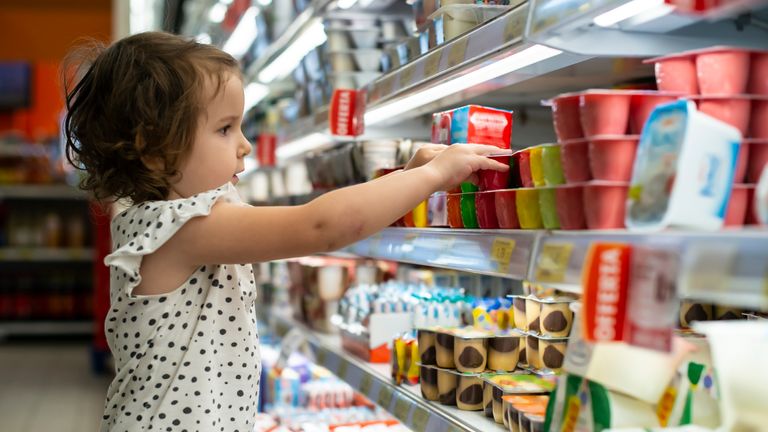Only one in 20 yoghurts aimed at children are low in sugar, researchers have said, as they urged the government to impose restrictions on kid-friendly packaging and the nutritional claims they make.
Action on Sugar, based at Queen Mary University of London, found Nestle Rolo Mix-in Toffee yoghurt had the highest level of sugar, with five and a half teaspoons per serve – the equivalent of 16 Malted Milk biscuits.
The health experts looked at 100 children’s yoghurts and found 63% contained a third or more of the maximum daily intake for added sugars (19g) per serving for a child aged between four and six.
They warned a “health halo” was being created around products which feature nutritional claims suggesting they are healthy while containing added sugar, syrups and fruit concentrates.
Image: Yoghurts are a staple of school lunchboxesDr Kawther Hashem, a registered nutritionist and campaign lead at Action on Sugar, warned that parents can easily be misled when choosing items at the supermarket.
Advertisement“Often companies try to avert our eyes from seeing the significant amount of sugar listed in the ingredients and nutrition tables, by using healthy-sounding claims and cartoony images on the front of the pack,” she said.
“Given only 5% of yoghurts with child-friendly packaging would have a green-coloured label as being ‘healthy’ for sugar, food companies must make every effort to reduce the sugar in these products, particularly the ones targeted so explicitly towards children.”
More from UK COVID-19: Delta variant can still be transmitted by people who are double jabbed, but protection against illness and death is high COVID news live: 94% believed to have antibodies in England – as James Dyson urges government to end working from home COVID-19 cases in England go up by 6% – following a two-week fall, Test and Trace figures reveal Denis Law: Manchester United and Scotland football legend reveals he has been diagnosed with dementia Mark Barrott: Man arrested on suspicion of murdering wife in Leeds after police find him in Scotland Thames Water agrees £11m compensation after customers overchargedIt is up to food firms to be more responsible when it comes to sugar content, said Graham MacGregor, chairman of Action on Sugar and professor of cardiovascular medicine at Queen Mary University of London.
“With 10 children out of every class of 30 leaving primary school either overweight or obese, it is imperative that food companies act more responsibly and commit to reformulate sugar, salt and calorie reduction instead of foisting unhealthy products on us that contain child-friendly packaging with misleading nutrition and health claims,” he said.
April 2020: Is there a link between obesity and coronavirus?A Department of Health spokesperson said: “Childhood obesity is one of the biggest health challenges that this country is facing and we are taking significant action to drive the food and drink industry to reduce sugar content.
“There is more to do and later this year we will be launching a consultation into infant food marketing and labelling as part of our efforts to arm parents with the best information.
“We are also restricting the advertising of foods high in fat, salt and sugar, changing the law to reduce promotions of less healthy food and implementing calorie labelling in large restaurants, cafes and takeaways.”
